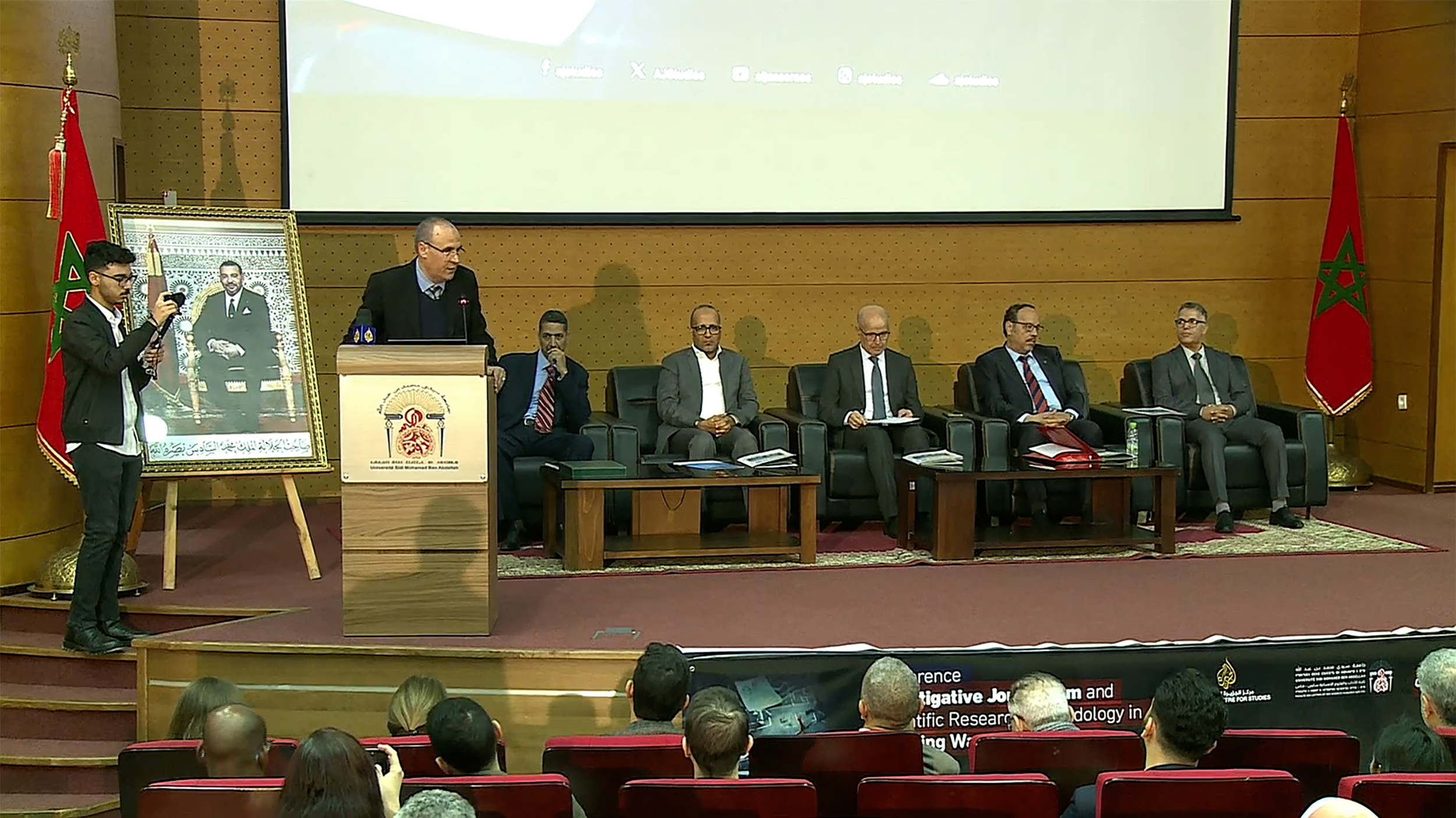
Al Jazeera Centre for Studies and Sidi Mohamed Ben Abdellah University held a conference in Fes, Morocco titled, “Investigative Journalism and Scientific Research Methodology in Covering Wars and Conflicts”, on the 4th and 5th of December 2024. The conference attracted a distinguished group of researchers and media experts from around the world, who discussed key issues related to investigative journalism, its role in highlighting conflicts, documenting crimes and violations, and contributing to international justice through the adoption of innovative scientific methodologies.
The importance of the conference
Dr. Mustapha Ijjaali, President of Sidi Mohamed Ben Abdellah University, inaugurated the conference, emphasising its significance as a distinguished academic platform for enhancing the skills of students and researchers in media and communication. He highlighted that the university aims to provide an educational and research environment that keeps pace with the rapid transformations in digital media, including artificial intelligence and data journalism. Dr. Ijjaali explained that the university's strategic vision integrates academic education with practical application, preparing a new generation of journalists and researchers capable of addressing modern challenges scientifically and professionally. He also stressed the university’s commitment to contributing to community development by equipping students with the tools and skills needed to address social issues and promoting media as a tool for positive change.
Cooperation between academic and media institutions
On his part, Dr. Mohammed Al Mukhtar Khalil, Director of Al Jazeera Centre for Studies, emphasised the importance of cooperation between academic and media institutions in developing investigative journalism as a powerful tool for addressing social and humanitarian issues. He pointed out that the conference addressed various challenges concerning the relationship between investigative journalism and research methodologies, particularly in the context of international conflicts such as the Russia-Ukraine war, the war in Sudan and the war on Gaza.
Dr. Khalil discussed the challenges facing international media amid intense polarisation, where media is often used to promote narratives and ideologies, obscuring facts and misleading the public. He explained that investigative journalism plays a pivotal role in confronting these challenges by uncovering the truth free from ideological bias. He called for providing investigative work with methodological frameworks that enhance its accuracy and independence, allowing it to deliver more credible and objective coverage.
Challenges requiring scientific approaches
Dr. Mohamed Elkassmi, Head of the Laboratory of Literary and Linguistic Studies and Media and Communication Sciences at Sidi Mohamed Ben Abdellah University, explained that the conference took taking place in a global context characterised by significant changes in the functions of media. He noted that contemporary media has evolved beyond its traditional role as a news transmitter and has become a key tool for news production and shaping public opinion, presenting new challenges that require precise scientific and academic solutions.
Practical research as a tool for developing investigative journalism
Dr. Mustapha Amrani, member of the conference’s organising committee and the Head of the Media and Communication Sciences Department at Sidi Mohamed Ben Abdellah University, highlighted the importance of this event in drawing attention to strategies for covering conflicts and wars in ways that adhere to professional standards and credibility. He also noted the need to leverage research tools as a primary means of advancing investigative journalism, fostering journalism based on thorough investigation and balanced presentation.
Key research themes
The research papers presented at the conference covered several key themes, including the social responsibility of journalism. The research called for redefining the role of journalism to strengthen its ability to uncover corruption and misconduct, while building a media discourse that serves the public good and avoids superficial sensationalism. The papers also focused on utilising digital technologies, such as social media networks and open-source tools, which have proven to support journalistic work, particularly in conflict zones, by collecting and verifying information quickly and accurately. The research stressed the importance of training journalists to use these tools effectively, thus improving the quality of media coverage.
Legal and methodological dimensions
The research papers highlighted the importance of the legislative environment in supporting investigative journalism, noting the need for legal frameworks that guarantee freedom of expression and protect journalists while balancing the media's role as a watchdog with public interest. Researchers stressed the importance of adopting precise scientific approaches when preparing investigative reports, particularly in conflict and war coverage. They pointed out that accurate documentation, objective analysis, and the avoidance of bias are crucial elements in ensuring the credibility of the findings presented to the public.
Technology and innovation in journalism
Discussions at the conference explored the use of artificial intelligence and data journalism as key tools to enhance the accuracy and efficiency of investigative journalism. Despite the vast potential of these tools, researchers warned against the risks of their misuse, calling for specialised training to help journalists use these technologies ethically and responsibly. The studies presented also emphasised the role of photojournalism as a key tool in investigative journalism. It was stressed that journalists must apply strict standards for analysing and using images in ways that contribute to providing balanced, reliable content that reflects reality objectively and accurately.
Investigative journalism as a pillar of social justice
All of the participants agreed that investigative journalism is a cornerstone for achieving social and political justice, providing the tools necessary to uncover facts and highlight fundamental issues. The conference accentuated the importance of fostering scientific dialogue on the future of investigative journalism in light of rapid digital transformations, addressing challenges, and leveraging opportunities to build more transparent and just societies.
Closing recommendations
The conference concluded with a series of recommendations aimed at strengthening investigative journalism as a tool for positive social change. These recommendations included the continuous training of journalists in research methodologies and the use of modern technologies, enhanced legal protection for journalists working in conflict zones, and expanded cooperation between academic and media institutions to develop investigative journalism practices. The recommendations also took into account the importance of adhering to ethical and professional values to ensure responsible content that supports transparency and accountability.